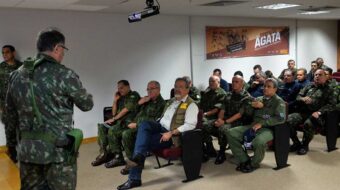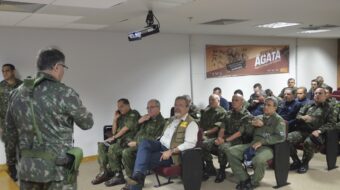The announcement last week of an agreement to end the four month political stalemate in Honduras has been hailed by many and shows some promise. However, as Roy Chaderton, the Venezuelan ambassador to the Organization of American States has said, it is not yet time to dance in the streets.
Since President Manuel Zelaya was overthrown and exiled by a right-wing coup on June 28 of this year, there has been an impasse between Zelaya and his followers and the supporters of the regime installed by the coup, headed by former congressional leader Roberto Micheletti. Almost all countries in the hemisphere have denounced the coup and attempted to pressure Micheletti to step down so that Zelaya can return to power, but Micheletti has been hanging on in the hope that national elections scheduled for November 29 will divert the world’s attention from the situation.
A mediation effort promoted by the Obama administration and headed by Costa Rican President Oscar Arias produced a plan whereby Zelaya would be returned to power under amnesty and with reduced powers, in exchange for concessions to the coup regime on the running of the elections. From the start, Zelaya was willing to accept this plan, but negotiations always broke down because Micheletti and his colleagues would not accept Zelaya’s return. On September 21, Zelaya managed to get into Honduras and has been in the Brazilian embassy ever since, while the Micheletti regime has done its best to suppress anti-coup protests by labor unions, farmers and other people’s sectors.
Last week, the Obama administration, which had applied sanctions against the coup regime, sent U.S. Assistant Secretary of State for Hemispheric Affairs Thomas Shannon and White House Special Assistant Dan Restrepo down to Honduras to lay down the law. This time, the Micheletti and Zelaya negotiating teams signed a joint agreement which would have the Congress vote to restore Zelaya to the presidency as part of a “national unity” government, while the November elections would go ahead. Zelaya would agree to give up pushing for a constituent assembly to rewrite the Honduran constitution. There will be a special international commission headed by U.S. Secretary of Labor Hilda Chavez and former Chilean President Ricardo Lagos, which will help supervise the implementation of the agreement.
The agreement by the Micheletti side to have the Congress and not the Supreme Court formally approve the agreement, including the return of Zelaya, appears to be a victory for Zelaya who appears to feel he has the necessary votes in Congress-while he has been in the Brazilian embassy, he has been meeting there with a broad spectrum of political party leaders. Shannon and Restrepo, in a press conference, attribute the apparent retreat by Micheletti to the pressure from the international community that they would not recognize the election results otherwise.
However, this agreement is very shaky and there is no certainty that it will not fall apart as have previous agreements.
For the agreement to take effect, the unicameral Honduran Congress has to vote to approve it. President Zelaya has insisted that this has to take place before Thursday of this week, when the new national unity government is supposed to be installed. However, Congress president Alfredo Saavedra so far has refused to commit to any timetable for such a vote.
Secondly, two months of the three month official election campaign season have now run their course under very abnormal conditions in which anti-coup candidates have not been able to campaign normally and in which the ability of the anti-coup press to report on events has sometimes been sharply restricted. Any more delay in returning to normalcy is likely to cause pro-Zelaya, anti-coup grassroots organizations to refuse to participate in or recognize the legitimacy of the results of the elections. .
Thirdly, there is the possibility that the highly partisan Supreme Court refuse to cooperate with the agreement, perhaps declaring it unconstitutional before the Congress even takes it up.
Finally, the military officers who physically carried out the coup are complaining that the agreement does not offer them any kind of legal immunity. In Honduras, grumbling officers are a bad sign.
So, no dancing yet.












Comments